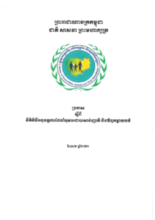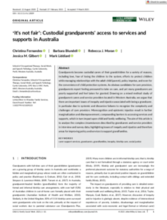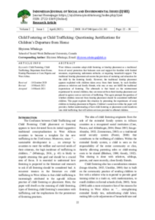Displaying 71 - 80 of 608
The Goal of the Prakas is to ensure the best interests of the child and protect the basic rights of the child separated from his/her biological parents and receiving kinship or foster care, so that they are safe and thriving in a warm, loving and happy family environment.
The purpose of this study was to explore the level of caregiver burden and parenting stress and their relationship among left-behind elderly individuals.
The aim of this study was to examine the academic trajectories of children in out-of-home care (OOCH) and whether kinship care has a protective effect relative to nonkin foster care.
This study examined the longitudinal association of depressive symptoms with grandchild care intensity and whether the association varies by household structure, residential area, and gender for Chinese grandparents.
The current study used survival analysis to investigate whether the type of placement (kin versus non-kin) related to the number of placement disruptions over time.
Drawing on a mixed method study of grandparent carers and service providers located in Western Australia, the authors of this article argue that there are important issues of inequity and injustice associated with being a grandcarer, in particular due to systemic and discursive failures to recognize the complexity and challenges of care provision.
This paper explores whether children removed from kinship placement should be considered trafficked children by presenting the experiences of some children in kinship placement in Nigeria.
Analyzing unique data from the 2017 Myanmar Grandparents Caring for Grandchildren Survey, this study examines the extent to which the middle generation's cross-border and internal migration are associated with caregiving intensity, perception towards grandchild care, and psychological well-being among grandparents.
In this How We Care series webinar, Family for Every Child presented the programming of three CSOs on how they are supporting kin carers and the vulnerable children in their care, in their respective regions.
An Australian research project explored the experience and support needs of young kinship carers and children in their care through analysis of census data and in‐depth interviews with young kinship carers and children/young people. This article describes the views of 16 young people.




